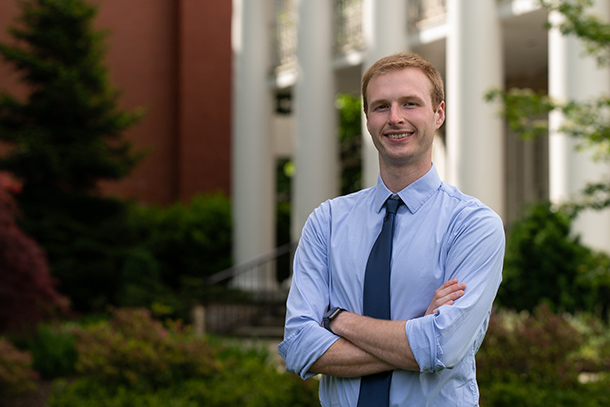
Bryan Habas received a National Defense and Engineering Fellowship Award, which will fund three years of the doctoral degree in mechanical engineering he is pursuing. Credit: Kelby Hochreither/Penn State
Mechanical engineering student receives Department of Defense fellowship
June 1, 2022
By Ashley J. WennersHerron
UNIVERSITY PARK, Pa. — Bryan Habas, first-year doctoral student in mechanical engineering at Penn State, has been selected for the National Defense Science and Engineering Fellowship Award. The fellowship funds three years of educational expenses and provides a monthly stipend and an allowance for travel and health insurance.
The fellowship is awarded to students pursuing doctorates in Department of Defense-related research areas from U.S. institutions, with the goal of increasing the number of citizens or nationals trained in areas of military importance, according to the program website. Fellows will also meet with one another to network and share their research projects in 2024.
After earning his undergraduate degree at Penn State Behrend, Habas accepted a job as a manufacturing engineer where he focused on optimizing the production of car seating. He said he soon realized that his true passion lay elsewhere.
“I decided to attend graduate school and redirect my attention to research and development of robotics,” said Habas, who completed his master’s degree in 2021 in mechanical engineering at University Park and is currently pursuing his doctorate degree under the mentorship of Bo Cheng, Kenneth K. and Olivia J. Kuo Early Career Associate Professor of Mechanical Engineering. “I feel really fortunate to have been connected with Dr. Cheng and this project. My full-time work matches what I used to do as a hobby.”
Habas works on small aerial robots, with the goal of enabling them to perch on dynamic surfaces rapidly and autonomously with arbitrary orientations. Small flying robots, such as quadrotors, can be used in reconnaissance, extended observation or in search and rescue operations, according to Habas, but they have limited battery life that cuts such missions short.
“They typically need to last for multiple hours and require a lot of power to keep their rotors spinning the entire time,” Habas said. “By learning how to reliably and autonomously land these flying robots on various surfaces, we can ensure that they can still do their programmed tasks without needing to use up their very limited battery life.”
Habas will present his work at the Institute of Electrical and Electronics Engineers’ International Conference on Robotics and Automation in Philadelphia this month.



